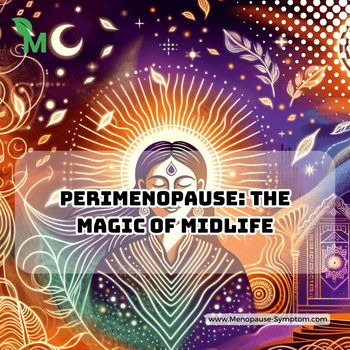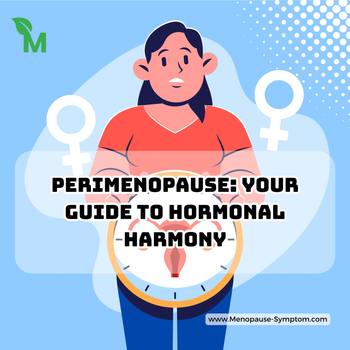Perimenopause is not just a transitional period, but also a new journey with many health and emotional discoveries. To have a clearer view of perimenopause, let's learn about this period.
What is perimenopause?
Perimenopause, which usually begins between the ages of 40-50, is the stage when the body begins to reduce estrogen production. This period lasts until you officially enter menopause, the time when your menstrual period stops completely. During perimenopause, the body will experience many different symptoms due to hormonal changes, from irregular menstrual frequency to signs such as hot flashes, insomnia or mood swings.
Symptoms of Perimenopause
It is important to note that the symptoms of perimenopause are varied and vary from person to person. Some people may find themselves experiencing only a few mild symptoms, while others may experience more significant problems. The most common are:
· Irregular periods: Your period may come earlier or later than usual.
· Hot flashes or flushes: Sudden hot flashes and sweating are the most common signs of perimenopause, and can vary in duration or intensity throughout the day and night, accompanied by snoring and difficulty sleeping. Hot flashes can last from 2-5 years. As estrogen levels decline, blood vessels can dilate rapidly, causing skin temperature to rise. This can cause a feeling of heat that radiates from the chest to the shoulders, neck and head. Sweating a lot and then drying will cause the skin to lose a lot of heat, leading to feeling cold, tired and lethargic. Hot flashes can last from 30 seconds to 30 minutes.
· Sleep disorders and night sweats: Night sweats are a common change that accompanies hot flashes. At night, you often wake up, sweat a lot and feel cold. Then you fall back into deep sleep. About 25% of middle-aged women have sleep disorders. Insomnia also affects your mood and general health.
· Mood changes: Anxiety, depression or irritability are more likely to occur than usual.
· Vaginal dryness: Changes in estrogen can lead to dryness, making sex difficult.
Why shouldn't you be embarrassed when facing perimenopause?
Perimenopause is a natural part of every woman's life. Instead of feeling anxious or embarrassed, we should face this stage proactively. Understanding perimenopause can help you find ways to manage your symptoms more effectively. Studies show that women who are well-informed about perimenopause and the appropriate treatment options feel more confident in taking care of their health.
Diet during perimenopause
Diet is an important factor that cannot be ignored during perimenopause. Choosing the right foods not only helps improve health but also reduces uncomfortable symptoms. Some suggestions for a healthy diet during this period include:
· Increase calcium-rich foods: Such as milk, chia seeds, and broccoli to prevent osteoporosis.
· Foods rich in omega-3: Such as salmon, flax seeds to maintain cardiovascular health.
· Fatty acids found in fruits, nuts, fish oil... are good for women whose skin becomes dry or shows signs of joint fatigue. Fatty acids help prevent vaginal dryness and urinary tract infections, and increase mental excitement and vitality for the body.
· Fresh fruits and vegetables: Provide fiber and vitamins to improve digestion and spirit.
· Minimize sugar and salt: Processed foods can increase hot flashes and weight gain.
Exercise and mental health
In addition to diet, exercise is also an important part of your daily life during perimenopause. Physical activities such as yoga, pilates or aerobics not only help control weight but also reduce anxiety and improve mood. In addition, a calm and positive mind will help you get through this stage more easily.
Treatments for perimenopause symptoms
If you feel that perimenopause symptoms are having a big impact on your daily life, consult your doctor. Treatments may include:
· Hormonal replacement therapy (HRT): Helps regulate the levels of estrogen and progesterone in the body.
· Symptom-relieving medications: Such as antidepressants, medications to treat insomnia, or medications to reduce hot flashes.
· Complementary therapies: Certain herbs such as phytoestrogens may help relieve symptoms.
The Role of Support from Family and Friends
During perimenopause, support from family and friends plays a huge role. Sharing your feelings, worries and joys with loved ones will help you feel empathy and reduce stress. In particular, participating in support groups or women's health seminars is also an effective way to find information and connect with people who have similar experiences.
Don't forget to monitor your health regularly
Maintaining a regular health check-up schedule is extremely important during perimenopause. Regular health check-ups not only help you monitor symptoms but also detect potential health problems early. Don't hesitate to discuss changes in your body with your doctor for timely advice and support.
Explore the depth of yourself during perimenopause
Perimenopause can be seen as an opportunity for women to explore and build themselves. This is the perfect time to take care of yourself, develop new interests, and learn about stress and how to reduce them. You can try learning a new skill, taking art classes, or simply making time for your favorite hobbies.
Conclusion
Perimenopause can be challenging, but it is also an important time to rediscover yourself and take care of your health. With adequate knowledge about perimenopause, a healthy diet, regular exercise, and support from loved ones, you can get through this period with more ease and confidence. Remember, perimenopause is a part of your life, and each stage has its own wonders that we can enjoy.
Source: Team MPS compiled, analyzed and wrote. Please dont reup without source. Many thanks.

Perimenopause: Skincare Tips For Aging Gracefully
Invalid Date
Perimenopause is a natural transition in every woman's life, it is the time when the body begins the natural transition to menopause, marking the end of a woman's reproductive years.

Perimenopause: The Magic Of Midlife
09.02.2024
Midlife in women, with its many physical and psychological changes, often makes many people feel anxious, especially when it comes to perimenopause.

Perimenopause: Your Guide To Hormonal Harmony
Invalid Date
Perimenopause is a natural stage in every woman's life, usually occurring between the ages of 30 to 50. This is the time when the body begins to change, with a decrease in the production of the hormones estrogen and progesterone.
